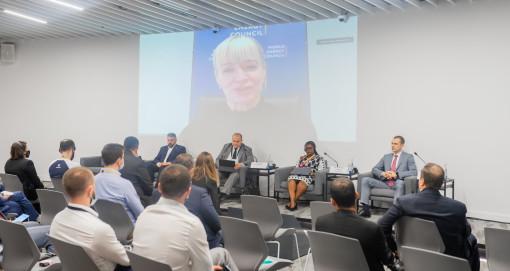Heading towards digitalization and efficiency. Energy specialists discussed possibilities and challenges of modern requirements to the distributed power generation facilities during the All Russia science to practice conference held in the frames of HEAT&POWER 2020 exhibition which took part in Moscow. The conference was organized by the Distributed Power Generation Association together with Business Russia’s Subcommittee on Small-Scale Power Generation, RNC of CIGRE national research committee and the Federal State educational establishment of Saint Petersburg,
On October, 27-29, the 5th HEAT&POWER 2020 international exhibition of boiler, heat exchanger and power generating equipment was held in Crocus Expo exhibition hall. The Distributed Power Generation Association became the key partner of the business program of the event.
On October, 28, the All Russia science-to-practice Own Generation at the Enterprise: Innovative and Non-Standard Technical Solutions conference took place. For the first time, the online broadcast of the event was organized together with the live discussion of the significant solution and innovation in power generation industry. The broadcast was sponsored by MKS Group of Companies, a leading company in distributed power generation industry in Russia.
The session was opened by the conference moderator Pavel Ilyushin, Vice-President of the Distributed Power Generation Association, Head of the RNС CIGRE C6 Subcommittee, Pro-rector for Research at FSAEE AVE PEIAT. He gave a speech on Conditions and Ways of Reliable Power Supply to Enterprises from In-House Generating Facilities. In his appeal the expert stressed that many enterprises are ready and interested in in-house power generation, particularly due to development of distributed power generation, high tariffs as well as a high wear-out rate of generating and distributing equipment of the Russian national grid resulting in accidents with mass outages of consumers. But at the same time it is important to understand that launch of an own generating facility does not guarantee increase in reliability of power supply to the consumers. It is important to create the required conditions, including those of technologies and infrastructure, and wisely review pre-design and design solutions, carry out full-scale tests, establish technical requirements, etc.
Alexander Fishov, professor of the Department of Automated Electric Power Systems of the Novosibirsk State Technical University followed up on the story and delivered a speech on Application of an Innovative Automation System for Implementation of Minigrids. He remarked that today not just distributed power generation facilities are being constructed but miniature power supply systems, Minigrids, which are shaping a separate branch of business and influencing large-scale power industry. Consequently, these systems are to be self-balanced, which requires new tools like fully automized unmanned control and management systems, a so-called automatic operator operating in correspondence with its rout cards and not just improving reliability of Minigrids, but also ensuring economic and technological efficiency.
Speaking of distributed power generation intelligent management via digital platforms, Sergey Kovalev, leading researcher at the Institute for Management Problems named for V. Trapeznikov, told about the innovative APlatform, a Russian software platform for managing distributed power generation, created on the initiative on EnergyNet NTI. This platform is like a construction kit designed for a wide range of energy facilities; like a basic structure which can be accomplished by customized applications for specific objects and consumers. The expert added that today level of digital platforms development allows launching demand aggregators. Soon corresponding aggregators of generation and distribution shall appear.
Alexey Zhavoronkov, head of in-house generation branch of Energy Efficiency and Sustainability business at Schneider Electric, took a little heat out of the technical discussion and presented Schneider Electric’s energy efficient solutions for the consumers wishing to build up own generation based on gas gensets: energy performance and factoring. The essence of the solution consists in turnkey implementation of distributed power generation projects by one EPC operator. The point of utmost importance for the customer is the fact that the EPC contractor provides for the financial guaranties of the project implementation. The EPC contractor guarantees to the customer achieving of the required features and technical and economical indicators, such as generation prime cost, availability factor, cost impact, etc. and is ready to provide the customers with a financial compensation if real features do not coincide with the rated.
An acute problem was raised in the presentation of Mikhail Sharygin, Professor of the Electric Power Generation, Power Supply and Power Electronics Department of the Nizhny Novgorod State Technical University n.a. R.E. Alekseev. The approach to the construction of relay protection and automatics is to be altered to ensure reliability of Minigrids with distributed energy sources. Nowadays this industry is not flexible; recalculation of relay protection settings, resetting of selective tripping plans while project changes take up to a few weeks or even months as everything is performed manually. The existing power supply system does not consider flexible changes in its protection. The technology suggested by the expert allows transition to the fully automated recalculation and setting, unmanned mode. When changes are introduced into the system, the corresponding signals are transmitted to the server, recalculation is performed, and new parameters are set in accordance with the new selective tripping plans. The whole process takes less than 1 second. There are developments which can be compared to the system in the world today.
The session was finalized by the presentation of Alexander Kulikov, professor of the Electric Power, Power Supply and Power Electronics Department of Nizhny Novgorod State Technical University n.a. R.E. Alekseev, associate professor, devoted to the Principles of Ensuring Cross-Platform Electronic Devices Cybersecurity in Distributed Energy Resources Management Systems. The expert emphasized that even though perimeter security of a digital substation was enough from the point of view of informational security until recent time, now the requirements both to separate devices and digital substation units have become tougher, which results in necessity of creating individual and multilevel protection architecture. New legal requirements as well as frequent cyber attacks resulted in construction of deeply layered and highly reliable system of informational protection ensuring flexibility and increased functionality of the control system.
The experts agreed that the time imposes new requirements and changes in energy supply systems are inevitable, including those provoked by high rate of distributed power generation development. Though it is important to understand that ensuring reliability, energy efficiency and financial viability during these changes can be only granted by intelligent approach to planning and design of new power supply systems considering all the modern conditions and possibilities.
It should be noted that more that 700 users watched the Internet broadcast on the website of the Distributed Power Generation Association and its page on Facebook. We thank the General Partner of the broadcast MKS Group of Companies
Speakers presentations:
- Conditions and Ways of Reliable Power Supply to Enterprises from In-House Generating Facilities by Pavel Ilyushin;
- Methods of Distributed Energy Resources Intelligent Management with the Help of a Digital Platform by Sergei Kovalev;
- Own Power Generation with Financial Guaranties for Commercial and Industrial Consumers by Alexey Zhavoronkov;
- Operating Values Automatic Calculation for Relative Selectivity Relay Protection Technology by Mikhail Sharygin;
- Principles of Ensuring Cross-Platform Electronic Devices Cybersecurity in Distributed Energy Resources Management Systems by Alexander Kulikov.

































